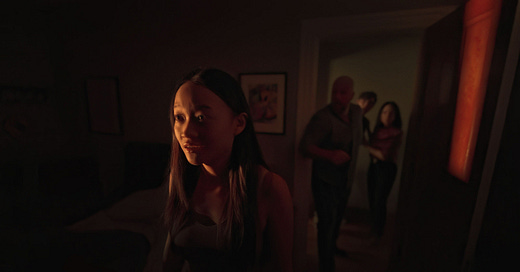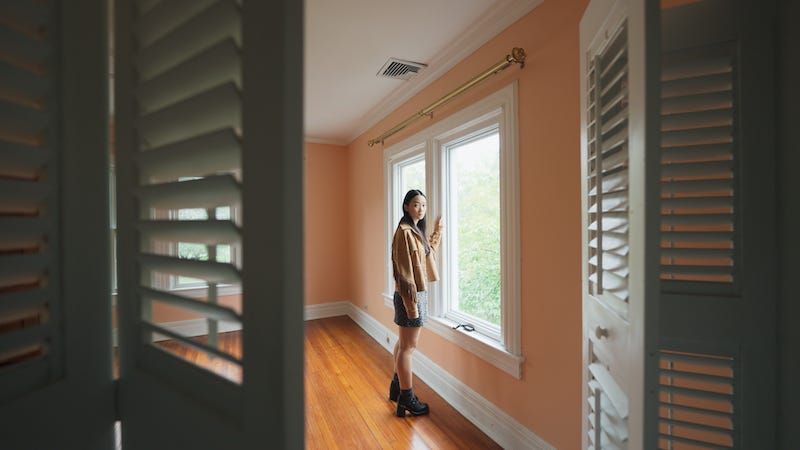The camera eye glides through a large and lovely suburban home as if trying to make sense of its surroundings, the lens slightly distorting the image in an otherworldly way despite the granite kitchen counters, the polished hardwood floors and the whole close-to-schools-and-shopping-ness of this upscale abode on a small-town street. Given that you walk into director Steven Soderbergh’s and screenwriter David Koepp’s Presence knowing that it’s a ghost story, you realize quickly, wordlessly, that this is a specter’s point of view. The whole film, in fact, remains so — distancing us from the goings-on of the family moving in, telling the tale from the opposite end of where it’s usually told. In all movies we are observers. In this one, we are observing the observer.
New homeowners Rebekah and Chris (Lucy Liu, Chris Sullivan) are at odds, their differences rooted in work / life balance and their teens’ issues. Type-A Rebekah, who works in banking, has entangled herself in some serious off-the-books finance-fiddling. That’s simply a side note to all the low-key family drama and eventual acceptance of something supernatural, but the way we see her trying to process the ramifications and/or find some way out informs her ends-justify-the-means relationship with her family. Well, not all the family: Everything she does is mostly for golden-boy Tyler (Eddy Maday), upon whom she dotes and is grooming for a career in sports. Who knows how far he might go? Her relationship with amiable sad-sack Chris and their daughter Chloe (Callina Liang) is ... not so much. Chloe and Rebekah have never really bonded and now Chloe is more distant than ever, caught up in standard-issue teenaged nonsense compounded by the fact two of her high-school friends have died from what the authorities say were drug overdoses.
Lucy Liu, Chris Sullivan, Eddy Maday, Callina Liang and Julia Fox, as a real-estate agent, in Presence
Anyway, so — the ghost ... you want to know about the ghost. Presence is haunted, shot from a POV that doesn’t belong to any of the characters and doesn’t acknowledge the anonymous presence of director / cinematographer / camera operator Soderbergh (using his usual alias, Peter Andrews, in the latter two roles). After some 125 years of cinema audiences well realize that in mainstream fiction movies there’s someone making dozens of decisions in every scene — choices about framing, angle, distance, movement and focus. But here, the ghost is the camera, “with its shutter open, quite passive, recording, not thinking.... Some day, all this will have to be developed, carefully printed, fixed,” to quote Christopher Isherwood in his prescient book Goodbye to Berlin (1939), which defined the core tenets of cinema verité and paved the way for its bastard child, found-footage fiction. Bear that in mind and it’s suddenly clear why you see the things you see in Presence: It’s all about the ghost’s perception of the real world in which they’re no longer real. Very cool idea ... imagine the disorientation.
The movie is far, far less about the family drama than, I’d say, about loss and coping and sometimes waking up and for one second not remembering who or where you are before your conscious mind kicks in and makes it all clear. Cue Talking Heads’ 1980 “Once in a Lifetime.”
Callina Liang as Chloe in Presence
And a shout-out to Soderbergh for shooting Presence in a remarkable eleven days. When I was an undergrad I worked on short student films that took longer to wrap.
Presence opens theatrically today.
Maitland on Movies is a reader-supported publication. To receive new posts and support my work, consider becoming a paid subscriber if you aren’t already.






